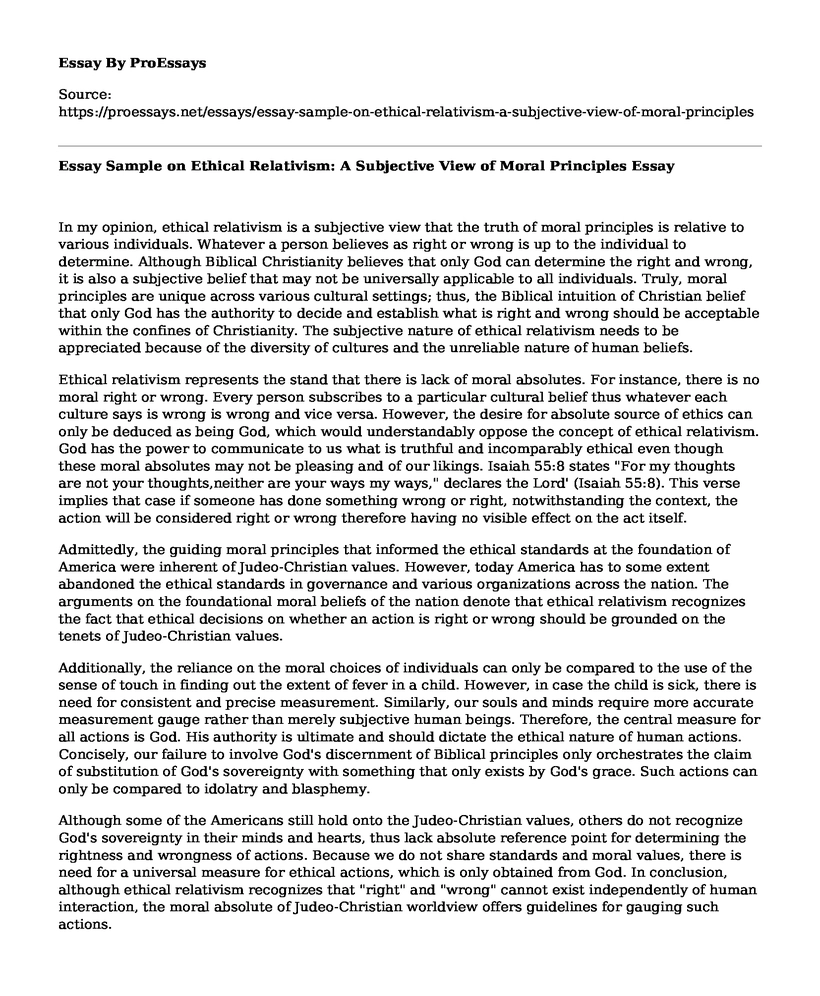In my opinion, ethical relativism is a subjective view that the truth of moral principles is relative to various individuals. Whatever a person believes as right or wrong is up to the individual to determine. Although Biblical Christianity believes that only God can determine the right and wrong, it is also a subjective belief that may not be universally applicable to all individuals. Truly, moral principles are unique across various cultural settings; thus, the Biblical intuition of Christian belief that only God has the authority to decide and establish what is right and wrong should be acceptable within the confines of Christianity. The subjective nature of ethical relativism needs to be appreciated because of the diversity of cultures and the unreliable nature of human beliefs.
Ethical relativism represents the stand that there is lack of moral absolutes. For instance, there is no moral right or wrong. Every person subscribes to a particular cultural belief thus whatever each culture says is wrong is wrong and vice versa. However, the desire for absolute source of ethics can only be deduced as being God, which would understandably oppose the concept of ethical relativism. God has the power to communicate to us what is truthful and incomparably ethical even though these moral absolutes may not be pleasing and of our likings. Isaiah 55:8 states "For my thoughts are not your thoughts,neither are your ways my ways," declares the Lord' (Isaiah 55:8). This verse implies that case if someone has done something wrong or right, notwithstanding the context, the action will be considered right or wrong therefore having no visible effect on the act itself.
Admittedly, the guiding moral principles that informed the ethical standards at the foundation of America were inherent of Judeo-Christian values. However, today America has to some extent abandoned the ethical standards in governance and various organizations across the nation. The arguments on the foundational moral beliefs of the nation denote that ethical relativism recognizes the fact that ethical decisions on whether an action is right or wrong should be grounded on the tenets of Judeo-Christian values.
Additionally, the reliance on the moral choices of individuals can only be compared to the use of the sense of touch in finding out the extent of fever in a child. However, in case the child is sick, there is need for consistent and precise measurement. Similarly, our souls and minds require more accurate measurement gauge rather than merely subjective human beings. Therefore, the central measure for all actions is God. His authority is ultimate and should dictate the ethical nature of human actions. Concisely, our failure to involve God's discernment of Biblical principles only orchestrates the claim of substitution of God's sovereignty with something that only exists by God's grace. Such actions can only be compared to idolatry and blasphemy.
Although some of the Americans still hold onto the Judeo-Christian values, others do not recognize God's sovereignty in their minds and hearts, thus lack absolute reference point for determining the rightness and wrongness of actions. Because we do not share standards and moral values, there is need for a universal measure for ethical actions, which is only obtained from God. In conclusion, although ethical relativism recognizes that "right" and "wrong" cannot exist independently of human interaction, the moral absolute of Judeo-Christian worldview offers guidelines for gauging such actions.
Cite this page
Essay Sample on Ethical Relativism: A Subjective View of Moral Principles. (2023, Feb 11). Retrieved from https://proessays.net/essays/essay-sample-on-ethical-relativism-a-subjective-view-of-moral-principles
If you are the original author of this essay and no longer wish to have it published on the ProEssays website, please click below to request its removal:
- Essay Example on Prominent Religion Personalities
- Cooperate Philanthropy Essay
- Death of Salesmanship and Miller's Death of a Salesman Essay Example
- Compare and Conctrast Essay on Kant's Ethical Theory and Mill's Utilitarian Approach
- Paper Example on Young Women's Christian Association: Symbolizing Body, Mind, Spirit Since 1855
- Teaching Kids Moral Values: Essential for Self-Realization and Social Control - Essay Sample
- Mystery of the Shroud of Turin - Essay Sample







